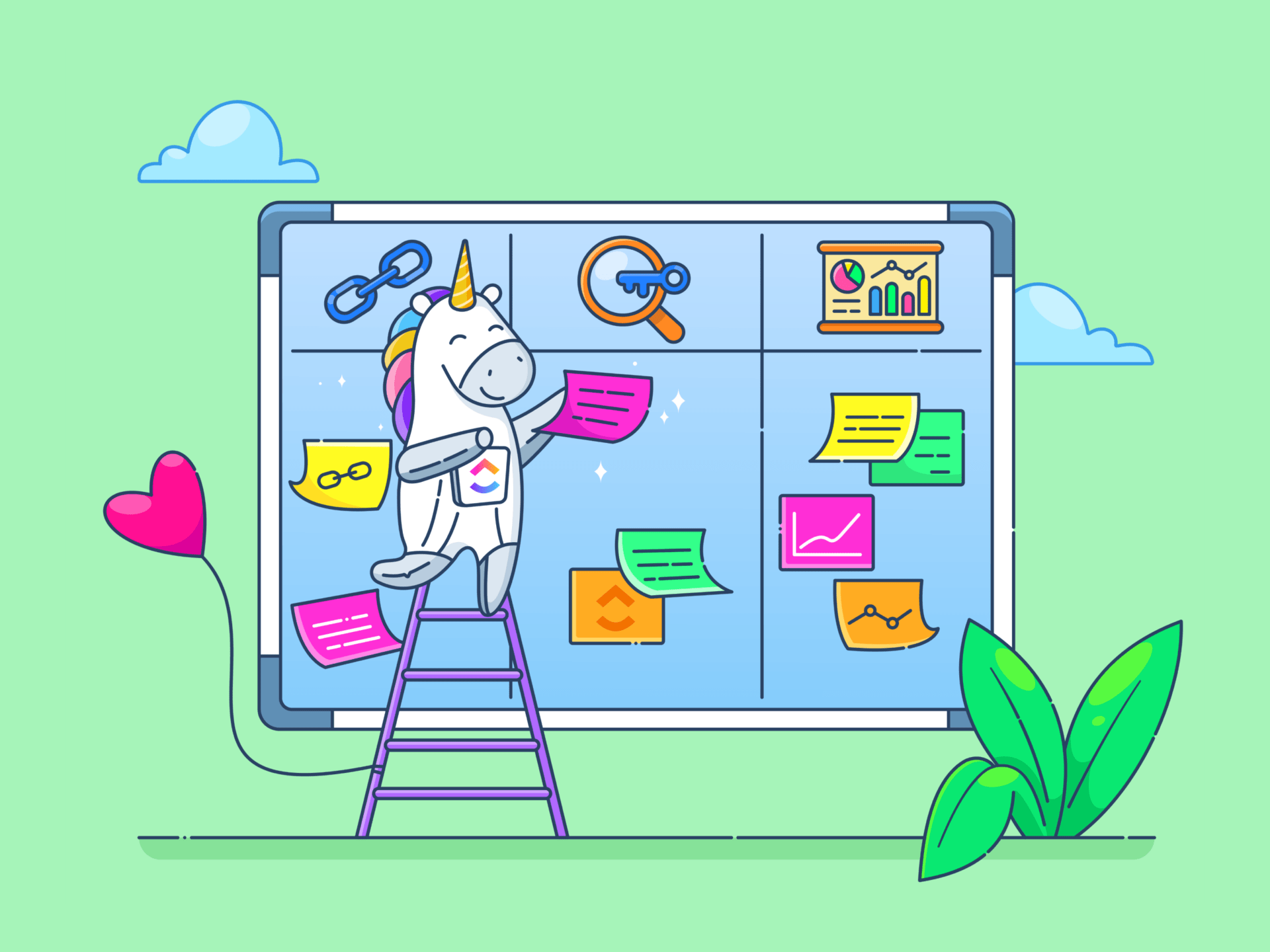إن إدارة المشاريع هي مسعى معقد يتطلب مهارات وفهمًا للمفاهيم المعقدة المنجزات وإدارة الأفراد. إذا كان من الممكن تشبيه إدارة المشروع بسفينة تبحر في مياه عاصفة، فإن مدير المشروع هو قبطان السفينة.
يحتاج مديرو المشاريع إلى التعامل مع توقعات العميل أثناء إدارة الموارد والوفاء بالمواعيد النهائية. يرسم مديرو المشاريع مسار المشروع، ويتوقعون الأزمات ويديرونها، ويتعاملون مع التعقيدات، ويوجهون الفريق ويحفزونهم للحفاظ على استمرار المشروع.
باختصار، يوم في حياة مدير المشروع ليس أقل من مغامرة مثيرة. لذا، تابع القراءة إذا كان لديك فضول لمعرفة المزيد حول ما يفعله مديرو المشاريع، ويوم نموذجي في حياتهم، والتحديات التي يواجهونها بشكل يومي.
سنشاركك أيضاً بعض النصائح والحيل العملية لمديري المشاريع وقائمة بالأدوات المفيدة لضمان بقاء بعثتك على المسار الصحيح وتحقيق أهدافها!
ما هو مدير المشروع؟
مدير المشروع هو محترف مسؤول عن تخطيط المشاريع وتنفيذها وإدارتها وإنهائها. على هذا النحو، يؤدي مدير المشروع دورًا حاسمًا طوال دورة حياة المشروع - وتحديدًا في ضمان عدم خروج المشروع عن نطاقه وميزانيته وجدوله الزمني.
أدوار مدير المشروع ومسؤولياته
قد تختلف أدوار ومسؤوليات مدير المشروع تبعاً لطبيعة المشروع، والصناعة، والهيكل التنظيمي، وغير ذلك من المتغيرات الأخرى. ومع ذلك، فإنهم يشاركون في الغالب في:
تخطيط المشروع
وضع خطة شاملة خطة المشروع التي تحدد الخطوط العريضة ل المقترحات والمهام والمهام الفرعية والجداول الزمنية والموارد. التشاور مع أصحاب المصلحة الرئيسيين لوضع اللمسات الأخيرة على التفاصيل، وتوثيقها في خطة مشروع شاملة تشمل النطاق والأهداف والميزانية والمخرجات
قيادة الفريق
تجميع فريق المشروع لتولي المشروع. تعيين قادة الفريق وتفويض العمل والمسؤوليات إليهم. بالإضافة إلى ذلك، معالجة المخاوف الأوسع على مستوى المشروع والحفاظ على تحفيز الفريق لتحقيق أهداف العمل
التواصل
ضمان التواصل السلس والفعال بين أعضاء الفريق ورعاة المشروع وأصحاب المصلحة الآخرين. شارك تحديثات منتظمة حول حالة المشروع والتقدم المحرز والمعالم الرئيسية والنكسات
إدارة المخاطر
تحديد المخاطر أو المشكلات المحتملة وتطوير استراتيجيات تخفيف المخاطر لمعالجتها أو التغلب عليها؛ توقع التغييرات وتنفيذ خطة سلسة لإدارة التغيير لضمان عدم التسبب في أي اضطرابات
إدارة الميزانية
وضع خطة مفصلة ميزانية المشروع مع وجود احتياطيات وهوامش كافية؛ ومطابقة الموارد مع الميزانية المخصصة، ومراقبة النفقات لمنع الإفراط في الإنفاق أو الإسراف في الإنفاق
ضمان الجودة
تحديد مقاييس الأداء أو صياغة المبادئ التوجيهية لتوحيد جودة مخرجات المشروع إجراء فحوصات تقييم الجودة الروتينية والمنتظمة لضمان التزام مخرجات المشروع بالمعايير المحددة والمتفق عليها
إدارة الجدول الزمني
وضع جدول زمني للمشروع على مستوى المشروع والمهام؛ وتحديد التبعيات و المسار الحرج للقضاء على التأخيرات التي يمكن تجنبها. حافظ على هذا الجدول الزمني ونسق الأنشطة لضمان إنجاز جميع المهام في الوقت المحدد
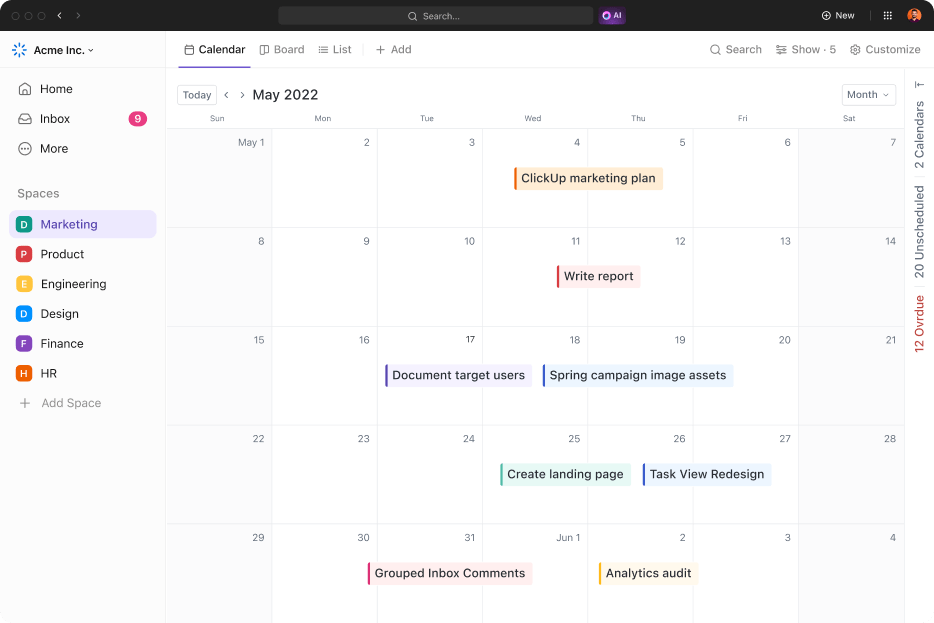
إدارة المشاريع وتنظيمها وجدولة المهام عبر طريقة عرض التقويم المرنة للحفاظ على مزامنة الفرق
مشاركة أصحاب المصلحة
تحديد أصحاب المصلحة الرئيسيين الداخليين والخارجيين والتفاعل معهم؛ معالجة أي مخاوف أو تلبية طلبات أصحاب المصلحة المعقولة لتعزيز مستويات الرضا
حل المشاكل
حل المشكلات التي قد تظهر أثناء دورة حياة المشروع؛ تبني عقلية مبتكرة لحل المشكلات لتحديد الاستراتيجيات التي يمكن أن تعزز قيمة المشروع
الاختبار والتقييم
اختبار المشروع للتحقق مما إذا كان يفي بالمعايير أو المواصفات المقررة؛ وسد الثغرات، إن وجدت
التوثيق
توثيق كل مرحلة من مراحل تطوير المشروع العملية، من البداية إلى النهاية؛ مشاركة هذه الملفات والوثائق, قوائم المراجعة ومذكرات اجتماع التقرير المرحلي اليومي، وما إلى ذلك، مع أصحاب المصلحة المعنيين؛ وإعداد دراسة حالة مفصلة لأهم النقاط الرئيسية والدروس المستفادة عند إغلاق المشروع
الإغلاق والتسليم
ضمان إغلاق المشروع بسلاسة. ويشمل ذلك أي عملية تسليم أو نقل للمعرفة أثناء تسليم المشروع إلى المالك
## يوم في حياة مدير المشروع
بما أن أدوار ومسؤوليات مدير المشروع تختلف من مؤسسة إلى أخرى، فإن الأنشطة اليومية تختلف بشكل كبير من مدير مشروع إلى آخر.
على سبيل المثال، يختلف اليوم في حياة مدير المشروع الذي يعمل عن بُعد اختلافًا كبيرًا عن مدير يعمل في المكتب.
وبالمثل، فإن مدير مشروع تكنولوجيا المعلومات في قطاع تطوير البرمجيات سيتبع أنشطة مختلفة مبادئ إدارة المشروع من العمل في الصناعة التحويلية. قد لا يتشابه يومان لمدير المشروع.
سيختلف يوم في حياة مدير المشروع خلال مرحلة التخطيط اختلافًا كبيرًا عن حياته اليومية أثناء ضمان الجودة. سيتضمن اليوم الأول بناء الفريق واتخاذ القرارات الاستراتيجية والتنسيق، بينما قد يتضمن اليوم الثاني اختبار الأداء الدقيق وتقييم مخرجات المشروع.
مع هذه الخلفية، إليك لمحة عامة عن يوم نموذجي في حياة مدير المشروع:
الروتين الصباحي

_الصباح موجه في المقام الأول نحو متابعة رسائل البريد الإلكتروني أو تحديث الآخرين
يتمحور الجزء الأول من اليوم في حياة مدير المشروع بشكل أساسي حول وضع جدول أعمال لأنشطة اليوم، وتنظيم المهام أو الأنشطة، وإحاطة الفريق، ومتابعة الاتصالات المتعلقة بالمشروع.
وعلى هذا النحو، سيتألف روتينك الصباحي من:
- التحقق من جميع الرسائل ورسائل البريد الإلكتروني التي قد تكون تلقيتها خارج ساعات العمل. قراءة هذه الرسائل والتصرف بشأنها - إرسال الردود عليها، وإضافتها إلى جدول أعمال اليوم، وإحالتها إلى قادة الفريق أو الإدارة العليا، وما إلى ذلك، وتحديد الأولويات المستمدةبنود العمل اعتمادًا على تأثيرها ومدى إلحاحها
- مراجعة الجدول الزمني لليوم السابق وتعليقه وعمليات التصعيد. استخدام هذه المدخلات لإعداد أو إعادة ضبط جدول أعمال اليوم. تحتوي خارطة الطريق اليومية لأعضاء الفريق على قائمة بالأنشطة حسب التسلسل الزمني والإنجازات المتوقعة أو المعالم الرئيسية وغير ذلك
- إجراء عمليات التحقق من الفريق واجتماعات المزامنة واجتماعات التقارير المرحلية اليومية للتعرف على التقدم المحرز والعقبات والأهداف القابلة للتحقيق عمليًا. قد يتضمن أيضًا بعض أنشطة بناء الفريق إذا كانت هناك فجوات في تماسك الفريق
- إعداد استراتيجية لليوم أو الأسبوع والحصول على موافقة قادة الفريق أو أعضائه. توصيل كل هذه المعلومات إلى الأطراف المعنية بحيث يكون الجميع على نفس الصفحة مع بدء اليوم مباشرةً
هذا الوقت من اليوم مخصص للتخطيط والتنظيم والتواصل. ومع ذلك، نظرًا لأن الصباح هو الوقت الذي يكون فيه المرء أكثر نشاطًا وتركيزًا، فكر في جدولة العمل العميق خلال هذه الجلسة.
أعمال منتصف النهار
يدور روتين ما بعد الظهيرة حول العمل المستقل ومكافحة الحرائق
مع انتقال اليوم إلى فترة الظهيرة، تتلاشى ببطء فورة الأنشطة. هذا لا يعني أن كل شيء يقع في فترة ما بعد الظهر في فترة هدوء. بل يتزامن هذا الركود ببساطة مع انتقال دور مدير المشروع إلى دور إداري حيث يقوم بمراقبة أو تنظيم جميع الأنشطة.
إليك ما يحدث:
- إدارة تنفيذ المهام، وتقديم الإرشاد والتوجيه عند الحاجة، والمشاركة في أنشطة الفريق.
- التأكد من أن المهام تسير وفق خارطة الطريق المقترحة لليوم؛ وإجراء مراجعات للحالة وتنفيذ أي تدخلات وتخصيص الموارد لدعم الفرق.
- حضور الاجتماعات مع أعضاء الفريق أو قادة الفرق أو رعاة المشروع أو مالكي المشروع أو البائعين أو غيرهم من أصحاب المصلحة؛ وإبلاغ القرارات أو الملاحظات الرئيسية إلى الفرق أو الأفراد المعنيين
- تعديل قائمة المهام أو الأهداف أو المعالم الرئيسية بناءً على حالة المهمة أو التقدم المحرز أو التحول في الأولوية أو أي تغيير آخر؛ تحديث الوثائق مثل المخطط البياني التنازلي, محفظة المشروع، أو مخطط جانت، وفقًا للتغييرات أو التطورات
أثناء ذلك، لا تنسَ تناول غدائك وأخذ قسط من الراحة لإعادة شحن طاقتك. استخدم هذا الوقت لتقوية صحتك العقلية والجسدية.
روتين المساء
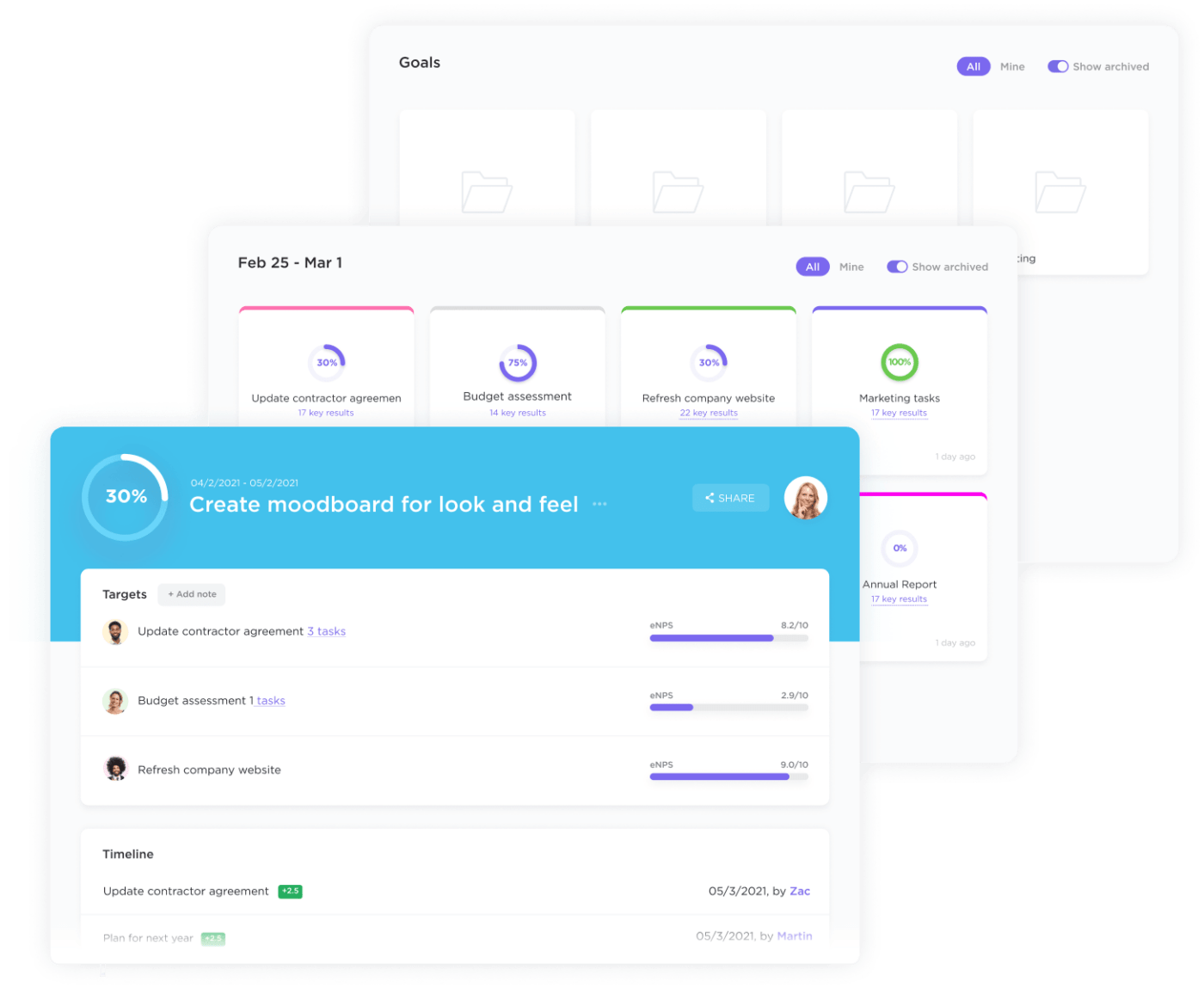
المساء مخصص للتفكير والمراجعة
الروتين المسائي هو أشبه بتصفية لأنشطة اليوم. هذا هو الوقت الذي ستتأمل فيه بهدوء وتتأمل في نقاط القوة والضعف والفرص والمعوّقات والإمكانات غير المحققة.
في هذه المرحلة، ستقوم في المقام الأول بـ
- الإبلاغ عن حالة المشروع إلى الإدارة العليا وأصحاب المصلحة الخارجيين. بالإضافة إلى جمع الملاحظات ونقل التحديثات وتأكيد القرارات، أي جميع أنشطة التوعية.
- مراجعة التقدم المحرز في اليوم ومقارنة الإنجازات مع الأهداف المحددة، مع ملاحظة التحديات التي واجهتها والحلول التي تم تطبيقها.
- تدوين أوجه القصور في اليوم وترحيلها إلى اليوم التالي؛ وتحديد هذه المهام؛ ووضع استراتيجية للحلول لسد الثغرات؛ وتحديد الأولويات
- إذا لزم الأمر، قم بإعداد أي وثائق أو تقارير نهاية اليوم ومشاركتها مع المشاركين
- وضع خطة لليوم التالي ومشاركتها مع الفرق
ابدأ في إنهاء أنشطة العمل تدريجيًا حتى تتمكن من تسجيل الخروج والحفاظ على توازن صحي بين العمل والحياة الشخصية. قم بتسجيل الخروج من البريد الإلكتروني للعمل وقنوات الاتصال الأخرى وركز على التطوير الشخصي أو المهني.
على الرغم من أننا حاولنا تغطية جميع الأنشطة الهامة حول يوم في حياة مدير المشروع، لاحظ أن هذا الجدول الزمني إرشادي بحت وليس ثابتاً. وكما ذكرنا، فإن الجدول الزمني يخضع لحالة المشروع ومتطلبات الصناعة والتفضيلات الشخصية. لذا، حافظ على المرونة لتصبح مدير مشروع رائع.
## التحديات الشائعة لكونك مدير مشروع
على الرغم من أن منصب مدير المشروع ديناميكي ومثير، إلا أنه يأتي مع نصيبه العادل من التحديات. فيما يلي نظرة عامة سريعة على بعض التحديات الشائعة التي تعترض طريق الإدارة الفعالة للمشروع:
زحف النطاق
زحف النطاق هو التوسع غير المقيد وغير المنظم وغير المصرح به في نطاق المشروع. ويمكن أن ينتج عن تغيير مفاجئ في متطلبات المشروع أو قيود الميزانية أو تعديل في الجداول الزمنية. وفي كلتا الحالتين، يعد التعامل مع زحف النطاق أحد أصعب التحديات التي يواجهها مدير المشروع - ومع ذلك، فهو أحد أصعب التحديات التي لا يمكن تجنبها، نظرًا لأن 33-37% من المشاريع تعاني من زحف النطاق
قيود الموارد
يمكن أن يشكل نقص الموارد أو القيود المفروضة على الموارد مثل الوقت أو الميزانية أو أعضاء الفريق (المواهب) عائقًا شديدًا في تلبية متطلبات المشروع وفقًا للجدول الزمني المطلوب
إدارة توقعات العميل
إلى جانب القيود المفروضة على الموارد، يجب على مديري المشاريع أيضًا الموازنة بينها وبين توقعات العميل. يجب أن يظلوا مرنين بما فيه الكفاية لاستيعاب طلبات التغيير المعقولة ولكن ليس مرنين أكثر من اللازم خشية أن يتطور الأمر إلى زحف النطاق
إدارة الوقت
يجب على مديري المشاريع أن يلعبوا دورًا مزدوجًا - يجب أن يكونوا مديرين مؤثرين للأشخاص ومديرين بارعين للوقت. ومع ذلك، فإن إدارة الموارد البشرية مقابل المواعيد النهائية و جداول المشروع يمكن أن يكون صعبًا، خاصةً عندما تنشأ تبعيات أو مشكلات غير متوقعة
التواصل المستمر
كما هو واضح الآن، فإن إدارة المشاريع هي وظيفة تتطلب الكثير من التواصل. فهي تنطوي على التواصل المستمر مع أصحاب المصلحة الداخليين والخارجيين، ويجب أن تكون دائمًا في حالة تواصل دائم. وأي انقطاع في التواصل يمكن أن يكون له عواقب كارثية
الإنهاك
الاضطرار إلى التنفيذ المستمر منهجيات تحسين العمليات والحفاظ على الاتصالات، وضمان الامتثال التنظيمي والقانوني، والحفاظ على التعاون، وتقديم التوجيهات يمكن أن يؤثر سلبًا على أي شخص - حتى أفضل مديري المشاريع - مما يتسبب في تعرضهم للإرهاق
الافتقار إلى السلطة
على الرغم من أن مدير المشروع على رأس جميع الأمور، إلا أن أعضاء الفريق قد لا ينظرون إليه كسلطة حقيقية بسبب النظرة الضيقة للأمور. هذه المقاومة يمكن أن تجعل من الصعب عليهم ممارسة السيطرة والتأثير والقيادة على أعضاء الفريق
الأدوات والتقنيات
اعتماد الحق برنامج إدارة المشاريع والترويج له في جميع أنحاء المنظمة قد يكون صعبًا. فمن ناحية، هناك العديد من الخيارات المتاحة في السوق، وقد يكون الالتزام بأحدها صعبًا. وفي الوقت نفسه، تنطوي مرحلة ما بعد التنفيذ على تدريب مكثف وإعداد مكثف على النظام الأساسي، ناهيك عن الوقت المرتبط بالتوقف أثناء منحنى التعلم
مكافأة:
/مرجع/ https://clickup.com/blog/project-manager-resume-templates//00 أمثلة على السيرة الذاتية لمدير المشروع /%!
في ثوانٍ فقط
بصمات
قم بإجراء اجتماعات سريعة يومية مع فريق المشروع الخاص بك ببضع نقرات

بطاقات السرعة السريعة لتتبع تقدمك خلال الأيام الماضية
الملفات
لمشاركة جميع الملفات والمستندات المتعلقة بمشروعك عبر منصة مركزية
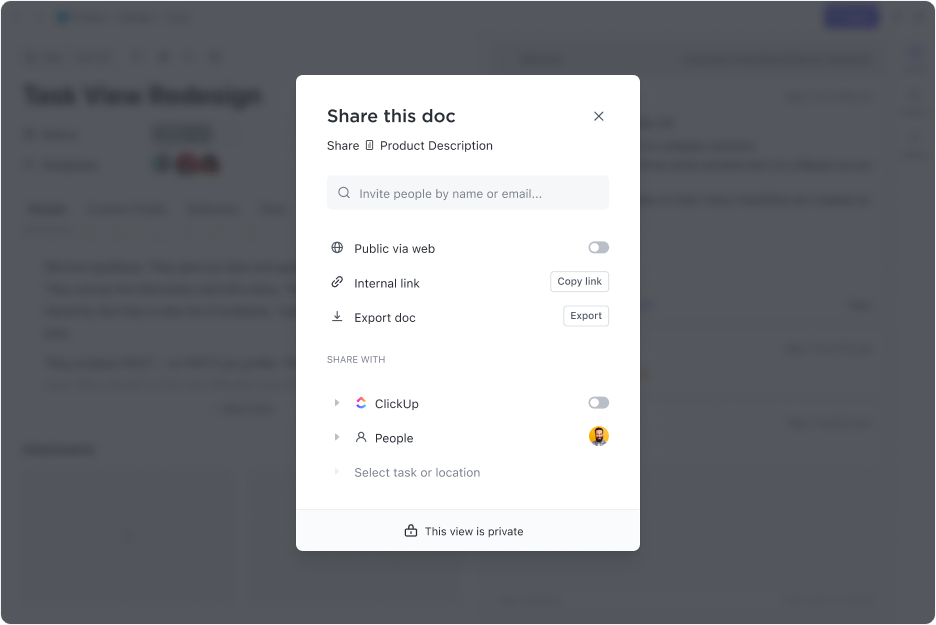
مشاركة المستندات بسهولة باستخدام ClickUp Docs
تتبع الوقت
اجعل كل ثانية محسوبة مع ميزة تتبع الوقت في ClickUp
![]()
كليك أب تسمح بتتبع الوقت يدويًا أو تلقائيًا
الدردشة
التواصل في الوقت الفعلي مع فريقك وأصحاب المصلحة الآخرين
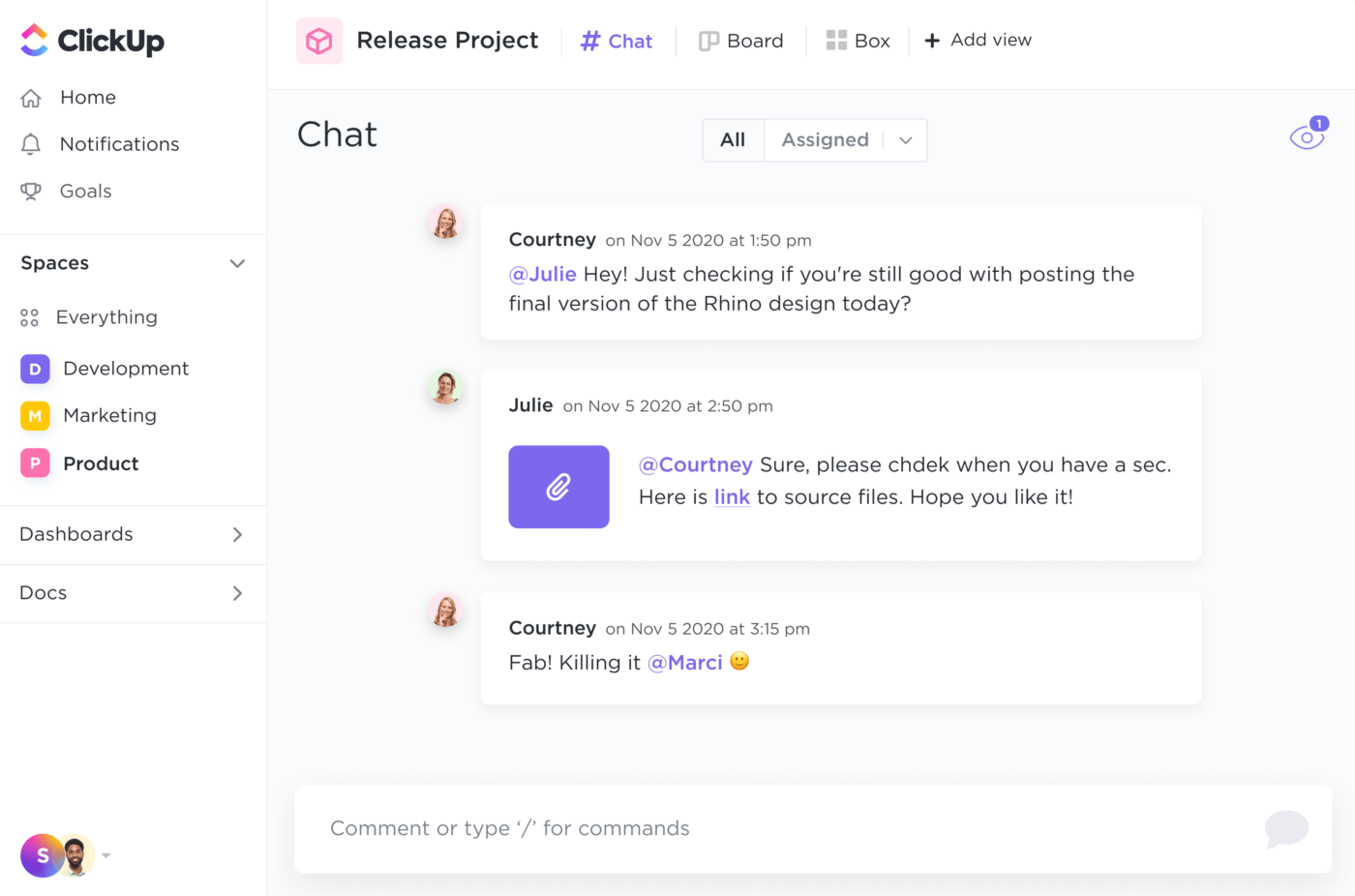
تواصل مع أصحاب المصلحة الرئيسيين باستخدام ClickUp Chat
اللوحات البيضاء
للعصف الذهني، أو تبادل الأفكار، أو التحليل التعاوني، أو اتخاذ القرارات الاستراتيجية مع فريقك

إجراء تحليل الأثر على ClickUp باستخدام اللوحة البيضاء
النماذج
ريتش قوالب إدارة المشاريع التي تضمن عدم الاضطرار إلى البدء من الصفر

الوصول إلى العديد من قوالب إدارة المشاريع المختلفة في مكتبة ClickUp
التكاملات
هل تريد أن تجعل ClickUp جزءًا من مجموعتك التقنية الحالية؟ لا داعي للقلق، يوفر ClickUp التكامل الأصلي مع جميع تطبيقات الأعمال والإنتاجية
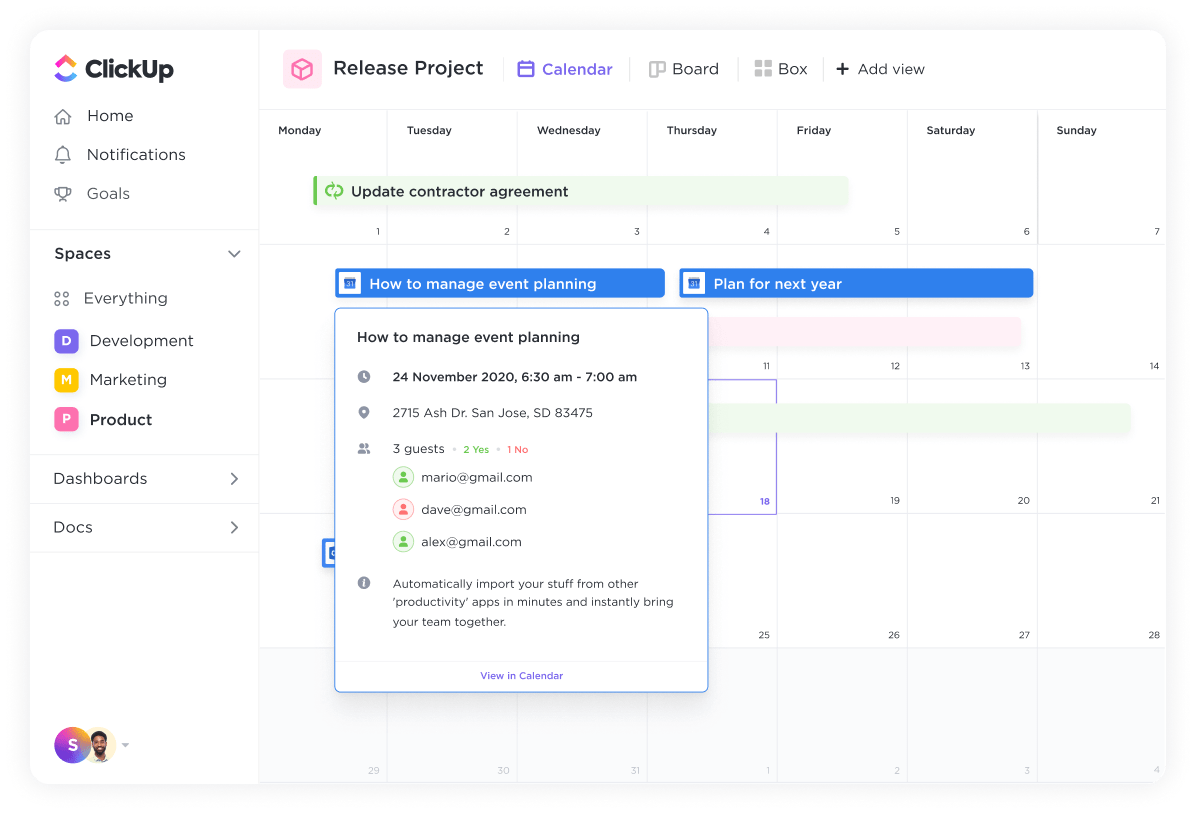
الاندماج مع أدوات مثل تقويم Google لزيادة سهولة التنقل
كل هذا، وأكثر من ذلك بكثير. كن محترفًا في إدارة المشاريع مع ClickUp!
جعل إدارة المشاريع أسهل: يوم واحد في كل مرة
لا يولد مديرو المشاريع الناجحون بالفطرة. فهم نتيجة تخطيط دؤوب يتبعه تنفيذ دقيق.
يمكنك تحقيق معظم النتائج باتباع جدول زمني منظم ومنظم لأنشطتك اليومية. يجب أن يبدأ اليوم في حياة مدير المشروع الناجح بمتابعة جميع رسائل البريد الإلكتروني والرسائل، والتخطيط للمهام اليومية والتسليمات، والتواصل مع فريقك.
بعد ذلك، اسمح لهم بالعمل باستقلالية والمشاركة كلما دعت الحاجة إليك. مع البقاء متاحًا ومتاحًا في الخلفية للحصول على الدعم والمساعدة، وتنظيم جميع الأنشطة الرئيسية.
قم بتوثيق نتائج يومك والتقدم المحرز والنتائج مع انتهاء اليوم. قم بالتعاون والتواصل والتحكم عند الحاجة.
بطبيعة الحال، لن يكون أي منها ممكنًا بدون مجموعة الأدوات المناسبة. فبدلاً من اختيار مجموعة من الأدوات والتقنيات غير الفعالة والمكلفة، فكر في دمج كل شيء.
أداة قوية أداة إدارة المشروع مثل انقر فوق يمكنه تحديد جميع المربعات وتلبية جميع متطلبات عملك. حدِّد موعدًا لعرض توضيحي معنا لمعرفة المزيد.
